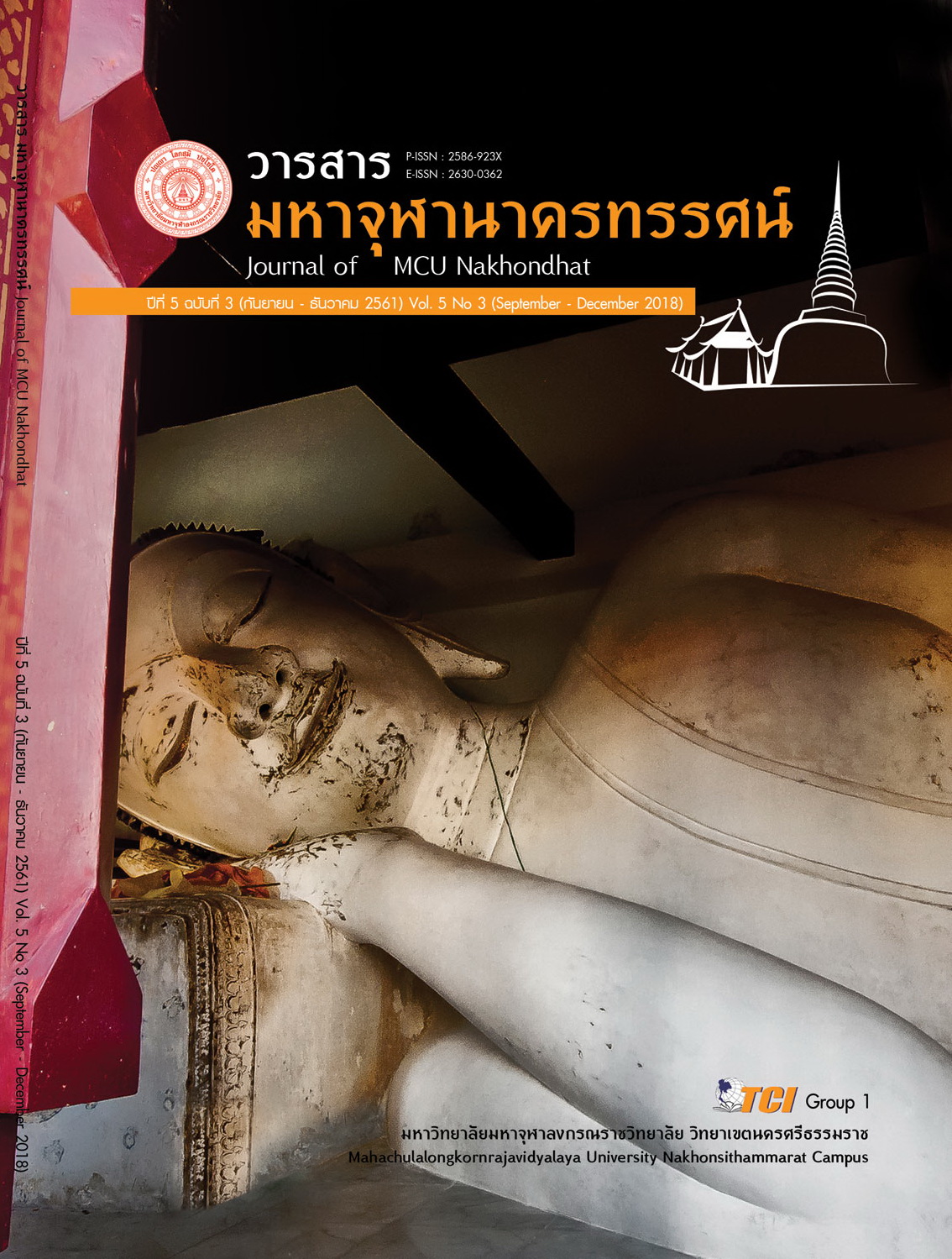THE DEVELOPMENT OF LIFE SKILLS IN SOCIAL AND EMOTIONAL SKILLS OF STUDENT IN THE VOCATIONAL.
Main Article Content
Abstract
This research is a study of life skills development in social and emotional skills of vocational students. The objectives of this research were to study the ways of participation in the development of life skills in social and emotional skills of vocational students to develop criteria for assessing skills of social and emotional skills of vocational students, and for the development of life skills training programs on social and emotional skills of vocational students. The study is divided into 3 phases which are;
Phase 1: Data collection was conducted by the principal informant groups which are administrators, teachers, parents and students. Content Analysis, the questionnaires were used to study the needs and the ways of participation in the development of life skills in social and emotional skills of vocational students, gather data for 900 students. The results of this study can be used as a guideline for participation in the development of life skills in social and emotional skills of vocational school students.
Phase 2: was the development of the criteria for assessing the social skills and emotional skills of vocational students. The results show that life skills in social and emotional skills are divided into 5 elements: interpersonal relationship, self-awareness, Empathy, Coping with emotion and Coping with stress. The quality of life skills developed in social and emotional skills can be used to assess the social skills and emotional skills of vocational students.
Phase 3: Development of life skills training program on social and emotional skills of vocational students. The results of the expert evaluation are good. When applied to 18 vocational students in the country. As a result, the vocational and life skills in social and emotional skills were significantly increased. It shows that the social and emotional skills training program can be used to improve the social skills and emotional skills of vocational students.
Article Details
References
กริช อัมโภชน์. (30 มิถุนายน 2558). การสร้างหลักสูตรฝึกอบรม. เข้าถึงได้จาก https://www.tu.ac.th/org/ofrector/person/train/hanbook/course.html
เครือมาส คำเขียน, ปกรณ์ ประจันบาน และเทียมจันทร์ พานิชย์ผลินไชย. (2556). การพัฒนาตัวชี้วัดทักษะชีวิตของนักเรียนระดับมัธยมศึกษาตอนปลาย. วารสารศึกษาศาสตร์ มหาวิทยาลัยนเรศวร, 15(2), 17-25.
นันทวัฒน์ ภัทรกรนันท์,วัฒนีย์ โรจน์สัมฤทธิ์, นิภา ศรีไพโรจน์ และอังศินันท์ อินทรกำแหง. (2556). การพัฒนาชุดฝึกอบรมโดยใช้กระบวนการเรียนรู้จากประสบการณ์เพื่อเสริมสร้างจิตสาธารณะของอาสายุวกาชาด. วารสารพฤติกรรมศาสตร์, 19(1), 23-36.
วิภาวี ศิริลักษณ์, ปกรณ์ ประจัญบาน และเทียมจันทร์ พานิชย์ผลินไชย. (2557). การพัฒนาตัวบ่งชี้ ทักษะของนักเรียนในศตวรรษที่ 21. วารสารศึกษาศาสตร มหาวิทยาลัยนเรศวร, 16(4), 115-165.
ศศิธร รณะบุตร, สิริมา ภิญโญอนันตพงษ์, บุญเชิด ภิญโญอนันตพงษ์ และราชันย์ บุญธิมา. (2558). การศึกษาและพัฒนาความมุ่งมั่นในการเรียนของนักศึกษาระดับปริญญาตรี สาขาการศึกษาปฐมวัย. วารสารบริหารการศึกษาบัวบัณฑิต มหาวิทยาลัยราชภัฏอุบลราชธานี, 15(ฉบับพิเศษ), 31- 43.
สกาวเนตร ไทรแจ่มจันทร์, จารุวรรณ สกุลคู, อรรณพ โพธิสุข และจตุพล ยงศร. (2558). การพัฒนา หลักสูตรฝึกอบรมเพื่อเสริมสร้างทักษะชีวิตสำหรับนักเรียนพยาบาลทหารอากาศ. วารสารพยาบาลทหารบก, 16(2), 21-29.
สมพร คงวิมล, สมชาย เทพแสง และสรภัคสรณ์ ฉัตรกมลทัศน์. (2558). กลยุทธ์การพัฒนาทักษะชีวิตของนักเรียน. วารสารบริหารการศึกษา มศว, 12(2) ,13-22.
สำนักงานคณะกรรมการการศึกษาขั้นพื้นฐาน. (2552). แนวทางการพัฒนาการวัดและประเมิน คุณลักษณะอันพึงประสงค์ตามหลักสูตรแกนกลางการศึกษาขั้นพื้นฐาน พุทธศักราช 2551. กรุงเทพมหานคร: โรงพิมพ์ชุมนุมสหกรณ์การเกษตรแห่งประเทศไทย.
สุกิจ โพธิ์ศิริกุล, เจริญวิชญ์ สมพงษ์ธรรม และคุณวุฒิ คนฉลาด. (2555). การพัฒนาตัวบ่งชี้ทักษะในการดำเนินชีวิตของนักเรียนโรงเรียนมัธยมศึกษาสังกัดสำนักงานคณะกรรมการ การศึกษาขั้นพื้นฐาน. วารสารการบริหารการศึกษา มหาวิทยาลัยบูรพา, 6(1), 32-46.
สุธาสินี กาญจนกิจ และวีระเทพ ปทุมเจริญวัฒนา. (2554). การจัดกิจกรรมการศึกษานอกระบบโรงเรียนตามแนวคิดการเรียนรู้แบบมีส่วนร่วมเพื่อพัฒนายุวมัคคุเทศก์ในเขตกรุงเทพมหานคร. วารสารอิเล็กทรอนิกส์ทางการศึกษา, 6(2), 49-63.
สุรชัย วัฒนาอุดมชัย, ธีรชัย เนตรถนอมศักดิ์ และจุฬาภรณ์ โสตะ. (2560). การพัฒนาหลักสูตร ฝึกอบรมเพื่อสร้างภูมิคุ้มกันการใช้ยาเสพติดของนักเรียนระดับชั้นมัธยมศึกษาตอนต้น. วารสารสำนักงานป้องกันควบคุมโรคที่ 7 ขอนแก่น, 24(1), 25-35.
อรุณี เวียงแสง และคณะ. (2548). การติดตามและประเมินผลแบบมีส่วนร่วม. กรุงเทพมหานคร: โครงการเสริมสร้างการเรียนรู้เพื่อชุมชนเป็นสุข (สรส.).
Bender, C. J. G. (2004). A life skills programme for learners in the senior phase: a social work perspective. Doctoral dissertation, Faculty of Humanities: department of Social Work, University of Pretoria.
Botvin, Gilbert J. (2006). Life Skills Training: Promoting Health and Personal Development. New Jersey: Princeton Health.
de Almeida, R. M. M., Cabral, J. C. C., & Narvaes, R. (2015). Behavioural, hormonal and neurobiological mechanisms of aggressive behaviour in human and nonhuman primates. Physiology & behavior 143, 121-135.
Elias, M. J., Gara, M. A., Schuyler, T. F., Branden-Muller, L. R., & Sayette, M. A. (1991). The promotion of social competence: Longitudinal study of a preventive school-based program. American Journal of Orthopsychiatry, 61(3), 409.
Elizabeth, Taylor T. (15 Retrieved September 2001). The Impact of the Going for the Goal Program on Life Skills Development in Adolescence. เข้าถึงได้จาก New Brunswick University of New Brunswick: from https://www.lib.umi.com/dissertations/fullcit
Erawan, P. (2010). Developing Life Skills Scale for High School Students through Mixed Methods Research. European Journal of Scientific Research, 47(2), 169-186.
Feindler, E. L., Ecton, R. B., Kingsley, D., & Dubey, D. R. (1986). Group anger-control training for institutionalized psychiatric male adolescents. Behavior Therapy, 17(2), 109-123.
Kolb, D.A. . (1984). Experiential learning: Experience as the source of learning and development. Englewood Cliffs, NJ: Prentice Hall.
Macmillan Education. (2015). The importance of life skills Report of The importance. เข้าถึงได้จาก Retrieved from https://www.macmillanenglish.com/life-skills/why-are-life-skills-important/
Maryam, E., Davoud, M. M., & Zahra, G. (2011). Effectiveness of life skills training on increasing self-esteem of high school students. Procedia-Social and Behavioral 30, 1043-1047.
Nelson-Jones, R. (1992). Group Leadership: A Training Approach. California: Brook/Cole.
Paryono, P. (2015). Approaches to preparing TVET teachers and instructors in ASEAN member countries. TVET@ Asia 5, 1-27.
Rahmati, B., Adibrad, N., & Tahmasian, K. (2010). The effectiveness of life skill training on social adjustment in children. Procedia-Social and Behavioral Sciences, 5, 870-874.
Ramesht, M., & Farshad, C. (2006). Study of life skills training in prevention of drug abuse in students. In Proceeding of the 3 rd Seminar of Students Mental Health (pp. 24-25).
Sharon, J. K., Sue, M., & Juliana, R. (2003). Building life skills through after school participation in experimental and cooperative learning. Child Study Journal, 33(3), 74-165.
World Health Organization. (1994). Life skills education for children and adolescents in schools. Pt. 1, Introduction to life skills for psychosocial competence: Pt. 2, Guidelines to facilitate the development and.
World Health Organization. (1997). Life skills education in schools (revised edition). Geneva: World Health Organization - Programme on Mental Health.
Young, M., Kelley, R. M., & Denny, G. (1997). Evaluation of selected life-skill modules from the contemporary health series with students in grade 6. Perceptual and motor skills, 84(3), 811-818.


